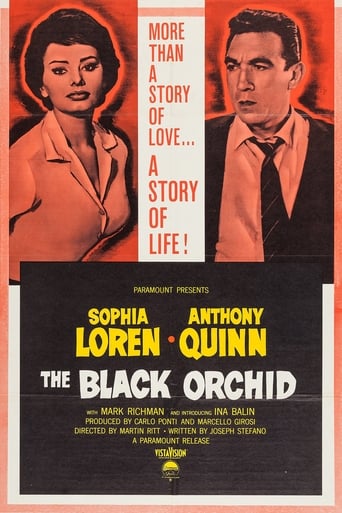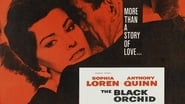tieman64
"The Black Orchid", a fairly anonymous picture by director Martin Ritt ("Hud", "Hombre" etc), stars Sophia Loren as Rose Bianco, a widowed florist who strikes up a relationship with widower Frank Valente (Anthony Qinn). Other subplots deal with Frank's grown up daughter, Mary (Ina Balin), who's reluctant to leave home and marry a man of her own; she fears that doing so will constitute an abandonment of her father.Indeed, virtually everyone in the film fears abandonment. Rose's son, stuck in a boarding school, feels discarded, as do Rose and Frank, who've been abandoned by their respective spouses, and Mary herself, who desires not to be torn away from her father. The film ends with these anxieties resolved, new connections made and bridges built.Amongst the cast, actor Anthony Quinn stands out; he's as infectious as usual. Sophia Loren is stiff, but this fits her role. The film was directed by Martin Ritt, who would go on to do a number of far more interesting films.7/10 – Worth one viewing.
dglink
An early effort by director Martin Ritt, "The Black Orchid" is an unconvincing melodrama about the romance between a widow and a widower. Each has a child that complicates the situation, although the widower's daughter provides most of the roadblocks to the couple's happiness. Filmed in black and white by Hitchcock favorite Robert Burks, the story is predictable and often frustrating and annoying. The widower's daughter, played by Ina Balin, evidently suffers from mental illness, although professional help is not sought. She locks herself in her room to protest her father's involvement with the widow, she walks out on her fiancé after he refuses impossible living arrangements, and she is obsessed with maintaining her hold on her father and his life. The character is unsympathetic, and most fathers would have put her on an analyst's couch, while most fiancés would have seen what the future held and walked out.However, the film cannot be completely dismissed, because the widow is played by Sophia Loren at her most beautiful, despite a nearly all-black wardrobe, and the widower is played by Anthony Quinn, who is wonderfully appealing in a rugged lovable way. Physically and emotionally, Loren and Quinn make a fine pair, and their performances rise above the problematic material. Quinn particularly has a difficult time making his character believable. That such an imposing forceful man would allow his daughter to ruin his life is hard to swallow, especially when the happiness of the widow, her son, and his daughter's fiancé also hang in the balance. Loren is on firmer ground in a role that takes the actress from mourning a dead husband to the joy of newfound romance. Her strong performance foreshadows her later work in "Marriage Italian Style." Loren's famous eyes are on full display, and the actress seems wise and earthy beyond her years. Perhaps Quinn's performance was not acting, because who could fail to fall for Sophia.The movie moves back and forth between sets and locations. Although the sets are well designed, their stagy nature is jarring when the action moves outdoors. Few actors stand out beyond the leads, except for a matchmaking neighbor amusingly played by Naomi Stevens. The screenplay by Joseph Stefano, better known for "Psycho," borders on soap opera and seems conceived for the stage. Like a well-oiled episode of "As the World Turns," "The Black Orchid" moves slowly to a predictable, if unconvincing, conclusion that extols the power of sausage, which is perhaps a symbolic key to the daughter's emotional problems. However, despite its flaws, the magnificent stars ultimately redeem the film and save it from the dustbin of Hollywood history. Unfortunately, Loren and Quinn no longer grace the screen, but fortunately their shadows linger and enhance even otherwise lackluster films such as this one.
dbdumonteil
Martin Ritt has always been a director concerned by social problems:racism,illiteracy,the lot of workers and trade unionism,juvenile delinquency.And some of his works are commendable:"Stanley and Iris","Norma Rae" "edge of the city" to name but three.This is the latter subject we find here:Ralphie ,whose late father was a gangster has been sent to a reform school.His mother (Loren) wants to marry an honest man (Quinn).But they've got to reckon with the guy's offspring who's not prepared to accept that.We deal with a "serious" sitcom which drowns out Ralphie's character.Sophia Loren 's portrayal is minimal,and Quinn cannot make up for it.The supporting cast,particularly Quinn's daughter,her fiancé and her confidant,has no presence at all.Get Douglas Sirk's "imitation of life" instead if you think melodrama can be great art!
moonspinner55
The soon-to-be-married daughter of a handsome widower is furious when her father starts dating the widow of a gangster. Anthony Quinn and Sophia Loren are quite good as the older lovers whose romance hits a family obstacle (Quinn, in particular, is well-attuned to his role), but the stereotypical Italian characters get to be a bit much. One can understand why Quinn's daughter is reluctant to let go of her papa (she's been mother and daughter to him for years), but her overwrought behavior--not to mention her over-acting--creates an hysterical mood which nearly undermines the love story. Martin Ritt directed, staging the piece with sensitivity yet never allowing the characters and their emotions to bloom. **1/2 from ****




